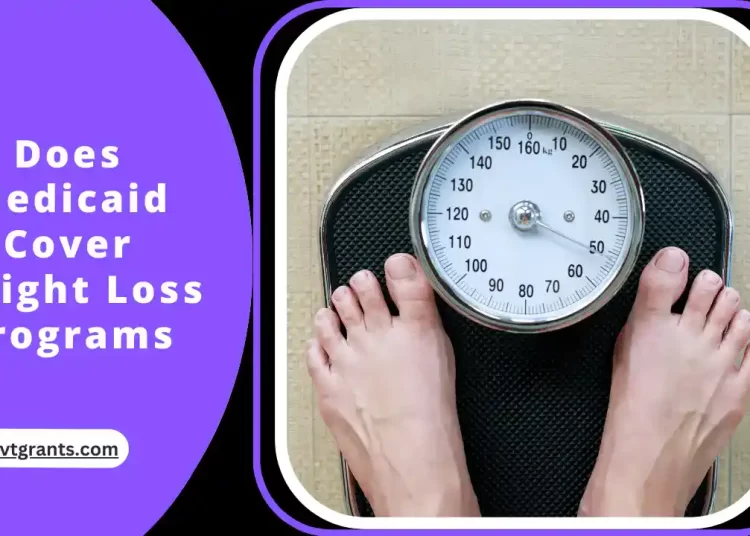Does Medicaid Cover Weight Loss Programs – Obesity brings a lot of health problems and preventable chronic diseases, and there is an increased prevalence of obesity throughout the United States of America, which is seen to be a serious public health challenge. Around 1 in 3 adults and 1 in 6 children and adolescents in the USA have obesity. For those who are enrolled in the Medicaid program would wonder ‘Does Medicaid Cover Weight Loss Programs’.
Fortunately, Medicaid plays a critical role in reducing the rate of obesity in America by providing access to healthcare services and programs that support healthy weight. Out of numerous weight loss remedies, the Medicaid program offers coverage for bariatric surgery. The operation changes the digestive system and stomach to help people lose weight and maintain a fit body. While many U.S. states provide coverage for bariatric surgery and medications through the Medicaid program, you need to meet certain eligibility criteria to get the coverage.
In this comprehensive guide, we will help you delve deep into how to cover weight loss programs through Medicaid in your state.
In this guide, we will help you delve deep into the following topics:
- Does the Medicaid program cover weight loss programs and obesity-related services?
- Does the Medicaid program cover weight loss medicines?
- Does the Medicaid program cover weight loss surgery?
- What are the eligibility criteria and documentation requirements to get coverage for Medicaid weight loss programs?
Highlights of this Post
Key Takeaways
- Medicaid covers various obesity-related services, including bariatric surgery, under certain conditions depending on the state.
- Eligibility for Medicaid coverage of weight loss treatments typically requires meeting specific medical criteria and documentation of obesity-related health issues.
- Coverage extends to medically necessary services for children under the Early and Periodic Screening, Diagnostic and Treatment Benefit, including obesity-related services.
- State-specific Medicaid programs may cover weight loss medications, but the availability and type of medication covered vary widely.
- Bariatric surgeries like gastric bypass and sleeve gastrectomy are covered by Medicaid in many states, provided specific eligibility criteria are met.
Does Medicaid Cover Weight Loss Programs And Obesity-Related Services?
For children enrolled in the Medicaid Early And Periodic Screening, Diagnostic And Treatment Benefit provides coverage for medically necessary service that comprises obesity-related services.
Other states decide which services to provide and many states choose to cover at least one obesity treatment. Both Medicaid and CHIP cover a wide range of services for preventing and reducing obesity, including body mass index screening, counseling, education on nutrition and physical activity, bariatric surgery and prescription drugs for promoting weight loss.
A recent survey of state Medicaid programs discovered that a growing number of U.S. states are covering services like counseling on healthy diet and obesity screening. In addition, the Affordable Care Act also calls for U.S. states to design public awareness campaigns to educate Medicaid beneficiaries on the availability and coverage of obesity-related services and other preventive programs.
Our next guide will help you learn how to get a free fitbit through Medicaid.
Does Medicaid Cover Weight Loss Medicines?
Whether or not the Medicaid program covers weight loss medicines depends on the state’s provision that runs and manages the program.
Being a joint federal and state program, it offers healthcare coverage to qualified low-income families and individuals in the United States of America. A few benefits are mandatory and are provided by individual state Medicaid programs, while other benefits, like prescription medication coverage, may be optional.
You can expect the following medications for chronic weight management depending on your state Medicaid plan:
- Saxenda (once daily injection)
- Xenical/ Orlistat (oral medication that is taken three times a day)
- Contrave/ Naltrexone/ Bupropion (oral medication that is taken two times a day)
Your Medicaid plan can also cover Type 2 Diabetes medicines that cause weight loss as a result of side effects such as:
- Victoza or Liraglutide (Once-daily injection)
- Rybelsus or semaglutide (Once-daily oral medications)
- Trulicity or liraglutide (Once weekly injection)
A few more medications like Wegovy or semaglutide, Ozempic or semaglutide or Zepbound have grown in popularity in recent days for managing weight. The Medicaid program can provide coverage for these medications based on your state’s program. The long-term use of these medications can cost more than $1000 per month.
GLP medications that are generally prescribed for weight loss, like Olympic semaglutide are generally covered by Medicaid if they are taken to treat type 2 diabetes. In states that are covering weight loss medicine centers, the Medicaid program requires prior authorization and can restrict quantities.
You can take a look at our next guide to know if you can get pediatric diapers covered by Medicaid.
Does Medicaid Cover Weight Loss Surgery?
Medicaid is a health insurance program that is geared towards low-income individuals. The federal U.S. government offers funding and guidelines; however, individual states have the flexibility to administer and manage their own Medicaid program. According to the reports of the 2022 obesity across America report nearly 48 U.S. states are providing some sort of Medicaid coverage for bariatric surgery that helps in weight loss journey.
This comprises coverage for surgical procedures like adjustable gastric banding and gastric bypass. Depending on your state’s provision for the Medicaid program, you can get coverage for pre-operative evaluations, post-operative care and hospital stays.
However, you have to meet certain medical criteria to get coverage for this weight-loss surgery. The coverage and eligibility criteria will vary by state or territory, and you need to reach out to your state or local Medicaid program to find out how the coverage will work in your area and help you attain weight loss.
Curious to know how to get a free YMCA membership with medicaid? Read our next guide here.
What Weight Loss Surgery Coverage Can You Get From Medicaid?
Only specific weight loss procedures are covered by Medicaid in your state. For instance, the Medicaid provision in North Carolina covers surgeries if you meet the following criteria:
- Gastric bypass
- Laparoscopic sleeve gastrectomy
- Biliopancreatic diversion with or without duodenal switch
- Adjustable gastric banding
The Medicaid provision in North Carolina does not cover operations like open-sleeve gastrectomy or gastric wrapping.
Do you want to know whether Medicaid covers Blood Pressure Monitors or not? Read our next blog now.
What Are The Eligibility Criteria To Get Coverage For Weight Loss Surgery Through Medicaid?
The eligibility criteria for weight loss surgery coverage varies from one state’s Medicaid program to the other. The regularity criteria to obtain weight loss surgery include the following:
- Must meet a minimum age requirement
- Should have a BMI of 40 or more
- Should have a BMI of 30 or higher and a minimum of one obesity-associated medical condition
- Must provide documentation of attempted weight loss control for a few months. This also includes psychological and nutritional evolution, laboratory blood work, diagnostic scans, and reports that offer related health complications.
- Must seek a healthcare professional to get a comprehensive medical history as well as physical examination
- Must not actively use alcohol common drugs or tobacco
- Must be free of illnesses or diseases unrelated to obesity
To qualify for Medicaid-covered weight loss surgery, you need to meet the specific criteria, that is, having a body mass index exceeding a particular threshold and having obesity-associated health problems. The obesity-associated medical conditions may include type 2 diabetes, high blood pressure, heart disease and sleep apnea.
You can head to our next guide to know how to get free braces with Medicaid.
Circumstances When Medicaid Will Not Cover Weight Loss Programs
Medicaid will not cover the cost of weight loss surgery or any other program if you are involved in the following situations:
- Pregnant or planning to conceive within two years of the surgery
- Currently having documented binge eating disorder
- Are actively engaged in alcohol or drug misuse
- It is also important to keep in mind that Medicaid will not cover cosmetic surgery to remove the extra skin or folds after weight loss surgery and you need to pay it out of your pocket.
How Can You Get Medicaid Coverage For Weight Loss Surgery?
The following is the list of steps that you need to follow to boost your chance of getting Medicaid coverage for weight loss surgery:
- You need to find out whether or not bariatric surgery would be considered medically necessary for you and if you’re the right candidate for the surgery. Talk to your healthcare professional and learn details about the same.
- Check your state Medicaid policy to learn details about the coverage and benefits for weight loss surgery, as well as the eligibility criteria that you need to meet to get the coverage.
- Gather relevant documents for your condition, prescription and description of your response to the treatment. Moreover, you also need to demonstrate that you can access post-stored operative surgical, cytological and nutritional services.
- The Centers for Medicare and Medicaid Services has made it compulsory for the bariatric surgery process to be done at a facility certified by the American Society for Bariatric Surgery as a bariatric surgery center of Excellence or by the American College of Surgeons as a Level-1 bariatric Surgery Centre.
- The specific kind of weight loss surgery covered by your state’s Medicaid program can vary. A few states cover procedures such as gastric bypass, whereas a few provide coverage for only gastric sleeve surgery.
Our next blog will cover whether Fertility Treatments Are Covered by Medicare or not.
Which Other Obesity Services Does the Medicaid Program Cover?
The Medicaid and the Children’s Health Insurance Program provides coverage for screenings and interventions for reducing obesity. These amazing tools help to promote healthy eating and maintain physical activity. Both Medicaid and CHIP provide coverage for obesity care services including the following:
- Education and counseling on physical activity and nutrition
- BMI screenings
- Prescription medicines for promoting weight loss.
USPSTF, or the US Preventive Services Task Force, requires the Medicaid program to cover both grade A&B services, including services that are highly recommended for preventive care food stores. Moreover, states also get increased federal match for preventive services under the Affordable Care Act.
Obesity screening and counseling is considered a grade B recommended service.
The Early And Periodic Screening, Diagnostic And Treatment Benefit is designed for Medicaid recipients who are below 21 years of age. The benefit covers medically necessary services for instance obesity related services.
The US Preventive Services Task Force advises healthcare professionals or doctors to assess obesity in children and adolescents, and the screening should start at the age of 6. Doctors should refer eligible patients to intensive, comprehensive behavioral interventions.
For adults above the age of 21 years, states can decide which services should be included in the Medicaid obesity coverage. According to USPSTF, healthcare professionals provide behavioral interventions to adults having a BMI of 30 or higher.
Michigan’s Approach To Childhood Obesity
One state that has taken concrete steps to address childhood obesity through the Medicaid program is Michigan. The Michigan Department of Community Health in 2009 sent a letter to the Medicaid providers to encourage them to conduct weight, height and nutrition assessments for kids during well-child visits.
This program aligns with the recommendations of the American Academy of Pediatrics. The American Medicaid program chooses childhood obesity as a topic for managed care performance improvement projects. Around 14 health plans implemented initiatives for improving BMI screening rates and documents.
Priority Health is one of the health plans that partnered with the community-based program Fit Kids 360 to address physical activity, nutrition and self-esteem among overweight kids and their families. The success of this program led to the expansion in many locations in Michigan including rural Fremont and Detroit.
Read our next guide to know which Dentists take Medicare and Medicaid For Adults near me
Does Medicare Cover Weight Loss Programs?
The Original Medicare Program can cover weight management services but does not cover weight loss programs for medications or services. It can cover weight loss surgery if you meet certain criteria. Medicare can also offer preventive weight loss screenings or nutrition counseling if you meet the criteria.
You need to pay out of pocket for services like meal delivery for weight loss, FDA-approved diet pills or medicines, and programs like Weight Watchers or Nutrisystem. A few Medicare Advantage (Part C) plans provide additional health and wellness services such as gym membership and fitness programs.
What Weight Loss Services Are Covered By Medicare?
Medicare does not provide weight loss services for all recipients and covers weight loss services necessary for medical conditions such as bariatric surgery or as a part of preventive care. Following are the weight loss programs covered by Medicare.
- Obesity Screenings And Counseling: Medicare Part B covers obesity screening, dietary assessment, and behavioral and nutritional counseling. You need to have a body mass index of 30 or above to get coverage for behavioral counseling and obesity screenings.l.
- Nutritional Counseling: Doctors recommend medical nutrition therapy for treating and managing certain health conditions like kidney disease and diabetes, and this includes nutritional therapy sessions, nutritional and lifestyle assessments, follow-up visits and lifestyle management.
- Fitness Programs: A few Medicare Advantage plans provide health and Wellness fitness such as SilverSneakers for adults who are 65 or above, a renewed active program by United Healthcare that covers the membership, health and fitness programs and Silver&Fit is a fitness program that provides nationwide services both 80% and online.
- Weight Loss Surgery: Bariatric surgery deemed medically necessary for weight loss can be covered by the Medicare program for those who have a BMI of 35 or higher and have an underlying health condition related to obesity.
Head over to our next guide to learn how to get incontinence supplies covered by Medicaid.
Which Insurance Companies Cover Weight Loss Surgery?
Weight loss surgery is covered by several health insurance companies. A few insurance companies that have covered weight loss programs or surgeries include the following:
Your insurance company can decline your claim in case your policy does not cover weight loss surgery. They also may deny if you don’t meet the eligibility criteria or if any documents are missing. You must ensure to communicate with your doctor’s office or insurance company before the surgery so that your claim is not denied.
Conclusion
In conclusion, weight loss surgery can be an expensive affair. More than 40% of adults in America have obesity, and more than 9% are living with severe obesity, which is defined as having a BMI or body mass index of 40 or higher. You need to check with your state Medicaid program to get comprehensive details about the most frequent question: ‘Does Medicaid cover weight loss programs’? While many states provide some type of coverage for bariatric coverage you need to meet the criteria in the coverage for an operation or for medicines. You can get Medicaid coverage for obesity-related preventative screening as well as counseling services. The Early and Periodic Screening Diagnostic and Treatment benefit covers obesity screening and counseling for eligible children.
Head to our blogs at Get Government Grants to avail free resources and government programs for low-income families. Our guide has numerous supportive programs and names of organizations that help people in times of need.
Frequently Asked Questions
What Are The Services Covered By Medicaid For Obesity?
The Medicaid and CHIP program covers a wide array of services for preventing and reducing obesity, for instance, body mass index screening, nutrition education and counseling, physical activity counseling, prescription drugs for weight loss and bariatric surgery.
Is There Any Weight Loss Covered By Insurance?
Whether or not your weight loss medicines or surgery is covered by insurance depends on your state of residence and the insurance program you’re enrolled in. To be a candidate for weight loss programs, you need to have a BMI of 30 or more and an obesity-related disease.















